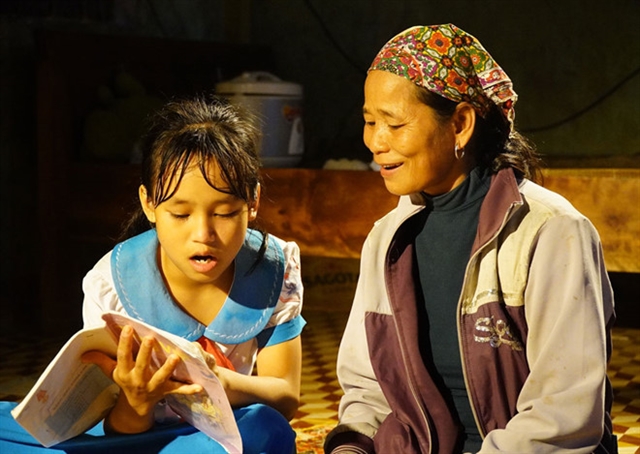 Society
Society

Pỉ Hoa, 67, is the oldest student at an adult literacy class in a poor remote village in the central province of Quảng Trị.

|
| Pỉ Hoa (right) asks her granddaughter to help her practice reading after class. — Photo thanhnien.vn |
QUẢNG TRỊ — Pỉ Hoa, 67, is the oldest student at an adult literacy class in a poor remote village in the central province of Quảng Trị.
The Vân Kiều ethnic minority woman has not missed a day since the class opened more than four months ago in Mới Village, Hướng Hóa District.
Hoa has seven children and 15 grandchildren, but she is illiterate due to poverty.
Hoa got married when she was 18 years old, and since then, she has moved to different places trying to earn a living.
“It was very hard for me to find my way because I could not read simple signs. When I was hungry, I was scared of going into a shop because I didn't know what they were selling,” she said.
Now everything has changed for Hoa.
Hoa became a source of inspiration for everyone, including her children.
After class, Hoa asks her grandchildren to help her revise.
Pỉ Lan, 47, has another reason for going to the class.
“I want to be literate so that I can teach my children and grandchildren,” said Lan.
Every evening, Lan sits on the floor in her stilt house and practises writing, despite her hands being covered in mud after a day working in the fields.
The only man in the class is Hồ Văn Phương, 37.
His wife suffers from a mental disorder. Phương wants to learn so he is confident enough to take her to hospital to talk about treatment.
Nguyễn Quang Hùng, the class teacher, said Phương was one of her smartest students.
Illiteracy elimination
The class was opened at the Hướng Linh Primary and Junior Secondary School.
Lê Minh Quốc, the school principal, said that teachers had put in a lot of effort to start the class.
Six teachers spent their summer vacations going to every house and encouraging ethnic minority women to attend the class.
“Encouraging adults to go to class is much more difficult than convincing children,” said Quốc.
They are the bread-winners in their families, they need food more than words. The feeling of inferiority also stops them from studying.
Now there are 37 students in the class, but many of them don't attend regularly due to work, so some teachers offer to pick them up by motorbike.
Gradually, the class has grown and is open from Monday to Saturday, from 5-8pm.
Teaching the women is also hard work.
Mai Lê Huyền, 27, a teacher, said the women were old so their hands were no longer nimble. It’s very difficult for them to hold a pencil, and takes them a long time to remember letters and numbers.
“It needs patience to teach them,” said Huyền.
When an inspection team from the Ministry of Education and Training visited the class, all of the teachers were happy to show their students were able to write and read their own names. — VNS




